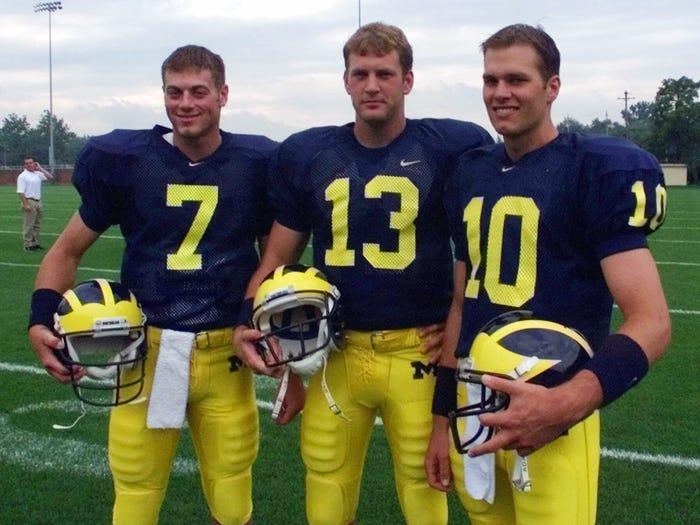If You Get the Chance
After winning a Golden Globe in 2006, Phillip Seymour Hoffman replied to a question about how he got to this moment in his life.
Nearly two decades later, his response is more relevant than ever.
“Even if you are auditioning for something you know you don’t like or are never going to get, whenever you get a chance to act in a room that someone else has paid for, it is a free chance to practice your craft. And in that moment, you should act as well as you can because if you leave that room and you have done this, there is no way the people who watched you will forget it. That is the only advice I have because it is always about that — if you are given the chance to act, take those words and bring them alive; and if you do that, something will ultimately transpire.”
This mindset explains how within two years, Hoffman played Sandy Lyle in Along Came Polly and Truman Capote in Capote, winning an Oscar for the latter.

Retired United States Navy General William McRaven echoed a similar sentiment in his book, The Wisdom of the Bullfrog, writing,
“I found in my career that if you take pride in the little jobs, people will think you worthy of the bigger jobs.”
He illustrated this point with a story from early in his career when rather than being assigned to lead a mission, he was tasked with building a float that would represent the Navy SEALs (often referred to as “frogmen”) in the Fourth of July parade.

After receiving the assignment, McRaven was admittedly dejected. In his mind, he had joined the Navy SEALs to lead missions, not build parade floats. But a seasoned team member offered him a quiet piece of advice, saying:
“Sooner or later we all have to do things we do not want to. But if you are going to do it, do it right. Build the best damn Frog Float you can.”
McRaven took the message to heart, pouring himself into the task and the float went on to win first prize in its category.
Over time, McRaven would lead far more consequential missions, including commanding the Joint Special Operations Command (JSOC) and later the U.S. Special Operations Command (SOCOM), which oversees all U.S. special operations forces, including the Navy SEALs, Army Green Berets, and Air Force Pararescue.
Unfortunately, I didn’t appreciate this lesson enough early in my career. As an example, after graduating from business school, I thought I could come right in and impart my newly found wisdom, when I should have been a better listener and executed the mundane tasks with as much vigor as the more interesting ones.
Fortunately, I don’t think I am alone. If I had to guess, anyone reading this can point to a similar moment in their career.
The thing is, this happens to all of us. Even the very best.
Look no further than Tom Brady, who has admitted he was consumed by this mentality early in his career at Michigan.
After his sophomore season, Brady was buried on the depth chart, only getting one or two reps per practice. As a result, he expressed his frustration to the coaches, to which head coach Lloyd Carr responded,
“Brady, I want you to stop worrying about what all the other players on our team are doing. All you do is worry about what the starter is doing, what the second guy is doing, what everyone else is doing. You don’t worry about what you are doing. You came here to be the best. If you’re going to be the best, you have to beat out the best.”

Carr then suggested Brady meet with Greg Harden, a counselor in the athletic department.
Once again, Brady vented his frustration — complaining about getting limited reps.
Harden’s advice was simple:
“Just focus on doing the best you can with those two reps. Make them as perfect as you possibly can. Then focus on the next two, and the next two, and the next two.”
How did Brady respond?
In his words,
“So, that’s what I did. They would put me in for those two reps, and man, I would sprint out there like it was the Super Bowl. I’d shout, ‘Let’s go boys! Here we go! What play we got?!?’ And I started to do really well with those two reps because I brought enthusiasm and energy. Soon, I was getting four reps. Then ten, and before you knew it, with this new mindset that Greg had instilled in me — to focus on what you can control, to focus on what you’re getting, not what anyone else is getting. To treat every rep like it’s the Super Bowl — eventually, I became the starter.”
We all know how Brady’s story played out from here, and it all started with two reps.
Last spring, my then eight-year-old son was wrestling with getting to play very limited minutes, so I read him this story about Brady. After sitting in silence for a few seconds, he looked up at me and said, “Tom Brady barely played too??”
To which I responded, “Yeah bud, like you. You just gotta make the best of your chances you’re given.”
After leaving his room that night, I thought to myself — I would give just about anything to be able to go back in time and tell my younger self this.
Would I have listened?
I hope so, but if this is a hard concept for adults to grasp, I imagine it’s even more difficult for kids.
Nonetheless, I wish I had appreciated this fact of life earlier. The fact is, someone is almost always watching, so it’s worth treating everything you do with purpose and pride. And, even if no one has their eyes on you, it is still a chance to “practice your craft”. To improve. To build strong habits.
Since time is limited, we only get so many opportunities.
We might as well take advantage of each one we get.